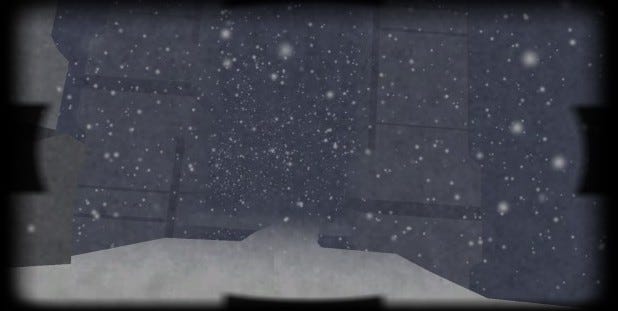Live Free Play Hard: Faint Ghost Of A Backstory
brief, mysterious hypertext
Nobody loves you; these games are the proof. Send suggestions for next week to @nobodybutyours.
Looking for more free games? Check out our round up of the best free PC games that you can download and play right now.
More by Erin Canterbury
This is a parser-based text game you can play in your browser. The preamble hints at something adventurous — a heist gone wrong? a boyfriend shot dead? a hastily purchased shovel? — but ultimately it's the way the game mixes this with the ordinary and domestic that I found particularly compelling. Its interest in the domestic is explicit from the start: "So there's this forest that's out of the way but not too far out of the way and some folks decided to dump their old household appliances." It turns out the game takes place in a series of forest clearings, each one a dumping ground dedicated to a specific category of household item: Toaster Hill, Microwave Clearing, Dishwasher Ridge. We're seeing the domestic misplaced, the familiar becoming heightened by losing its ordinary context. The appliances transform into installation, somewhere between folk art and conceptual art, and that sort of transformation also describes how the game gives extra charge to a its brief domestic interludes — reminiscences, really — by placing them adjacent to the heist genre material.
There's a bit of a puzzle to figure out, and your ease in doing so will probably come down to how familiar you are with parser games. Don't forget to check your pockets.
(via Emily Short)
Fignermukcre by Wiley Codger (also available in-browser at GameJolt)
Fignermukcre is utterly fantastic, a simple action game ruleset that keeps yielding more and more nuance. The first thing setting it apart from a lineage of collect-and-avoid games is its novel control scheme, but eventually the controls become intuitive and even then the game feels both magical and meticulous.
It feels a bit like playing an instrument. You control three rectangles along the bottom of the screen, and you can move them leftward one column at a time with the A, S, and D keys or rightward with the J, K, and L keys. Look at your keyboard to see why this might make sense. The A and J keys control whichever rectangle is at that moment furthest to the left, the S and K keys control whichever one is currently in the middle, and they D and L keys control whichever one is on the right. So already from the start it's stretching your brain a bit. There's a lot of room for crossed connections as you frantically try to move the rightmost rectangle leftward (with the D key, using the rightmost finger on your left hand).
The controls are almost intuitive — there's a solid bodily logic to it — but they're foreign. The game is asking you to learn this new language.
The instructions only tell you to avoid the falling red squares, but it's soon clear there's another strict requirement as well. Points are scored by collecting the black squares, and your rectangles require a steady diet of these to keep from shrinking into oblivion. (The iconography indicating the imminence of this secondary lose-condition is particularly clever.)
Somewhere around the 30 or 40 point mark a reversal of priorities starts to come into focus, revealing a tightrope balancing act you need to maintain. And there are a few subtleties to the movement mechanics that at first seem incidental, maybe even purely aesthetic, but end up crucial to understand for high level play.
It took a lot of trying and failing to reach even 10 points, which probably marks this as a High Difficulty game. I've now reached 100 (twice!), but beyond that I keep mucking it up.
composition 83 by rorschach\larshe
This is a remarkable first-person exploration game that reflects the crystalline structure of a short story. Its narrative is slight but compelling, and it's very smart about how backstory intersects with the world in front of you. It feels like what you might get if Lydia Davis wrote science fiction. There's a bit of dialogue, but most of what matters you need to observe on your own.
I don't want to give away any of its small surprises — it'll only take you 5 or 10 minutes, WASD keys and mouse — but the first thing you'll notice is its atmosphere. Its world is thick, and your place in it unwieldy. Move forward and you'll find yourself tilting queasily with each step. Turning your head takes so much effort. Your breathing is heavy, maybe even belabored. Is that snow floating upward around you? Or ash? The way these initial observations are ultimately grounded in its faint ghost of a backstory felt to me sublime.
(via Porpentine)
Wyrmery by Jonathan Whiting
Wyrmery asks you to twist through the ground as a large but dexterous worm. It's fun even just to move around. You only have direct control when digging through dirt, and the dirt gets eaten up as you move through it, so you end up soaring through the gaps you've previously left behind. There are pesky humans about so you might as well eat them. How else will you build up the nutrients it'll take to make babies? My favorite part was seeing just how much better at being a worm those children are. So fast! So dexterous! So hungry!
Gonubie Hotel by Ian MacLarty
Gonubie Hotel takes four arcade games and stuffs them into one CRT monitor, each overlaid on the other, the arrow keys controlling all four at once. It's overwhelming. You can't possibly keep track of everything but it's pleasurable even to try. Failure comes quick but the games continue apace. It's especially clever how each makes use of the shared screen space in such distinct ways, and it's notable that none of the games keep track of your score.
Ian frames it well: "[It's] about my experience of video game arcades as a child - the seductive allure of all those flashing lights and sounds, the smell of stale cigarette smoke, the vague sense of disappointment when some games weren't as amazing as they looked."
(via makega.me)
Bonus Games
Jason McIntosh's Barbetween is a brief, mysterious hypertext you can only access via a Myst-themed multiuser-authored MMO. It asks more of you than you expect. (Note: free registration required; via Emily Short)
Alec Thomson's clever DeepWeb asks you to track down cybercriminals using Mine Sweeper-like cybertools and logic-honed cybersmarts.
Porpentine reports in with Caelyn Sandel's Cis Gaze, a hypertext depicting "the way attention is divided every single second of being trans in public, the mental drain that comes with being constantly scrutinized."
Adriel Wallick's untitled prototype #5 plays at first like a fun, idiosyncratic drawing tool but reveals a neat game structure the moment you discover you've failed.


















